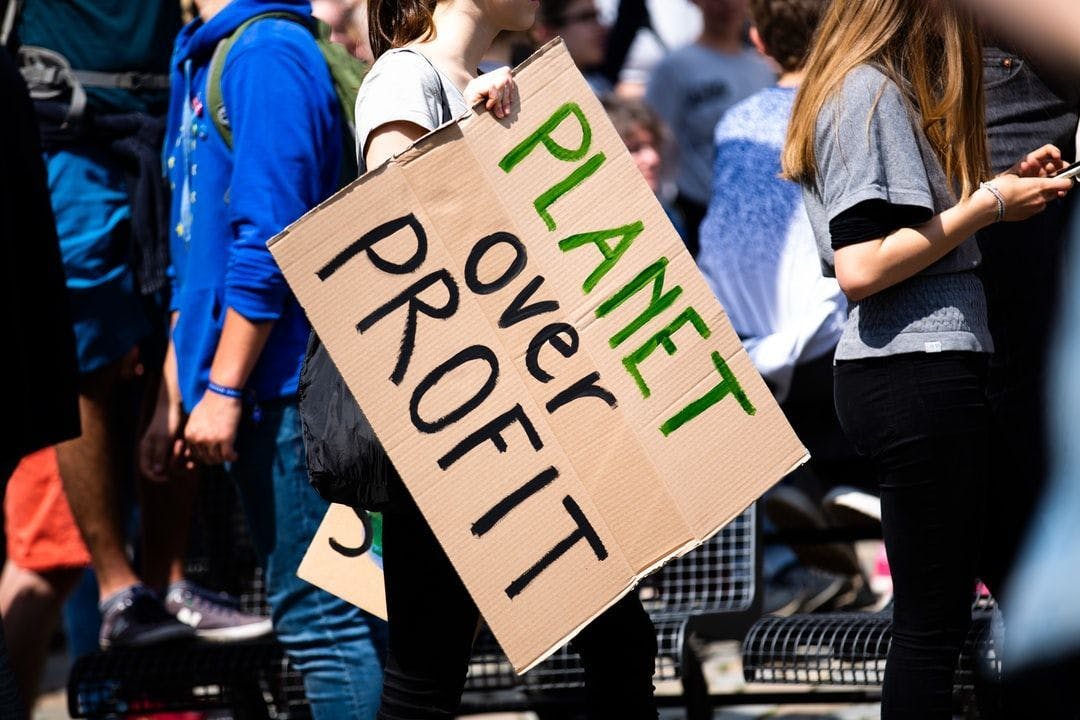Climate Change is an ongoing concern for both the general public and governments around the world. However, the lengths we're willing to go to make a positive impact and reduce our damage on the planet varies, with different fronts ready to accommodate a personalized agenda. In this slogging thread, our community discusses the climate crisis and their views on worldwide measures.
This Slogging thread by Mónica Freitas, Jack Boreham, Limarc Ambalina, Favour Amadi, Sara Pinto and Abeer occurred in slogging's official #technology channel, and has been edited for readability.
Researchers are developing artificial intelligence that could assess climate change tipping points. The algorithm could act as an early warning system against runaway climate change. It can also predict tipping points in ecology and epidemiology and even in the stock markets.
What do you think this could mean to us, as a global society? How can this AI algorithm prevent or prepare us for upcoming changes? What other uses can it have? Will it have any impact o how we make decisions?
Mónica Freitas, that's very interesting! Predicting tipping points could help us shape climate policy in governments. Certain levels require certain actions, allowing effective policy control of climate change. It's kind of a similar way in which governments rank terror threats. Ranking climate change threats using this technology could help stabilise the environment.
I think this is good but based on how humanity has done so far, most people don't care. We have scientists all over the world telling us we have a limited amount of time until the point of no return and most governments haven't acted on it.
I'm cynical and not optimistic about this because if people aren't going to believe thousands of scientists, why would they care if an AI told us about it.
You know what I mean?
But in terms of other similar use cases, a friend of mine in a University in Tokyo is developing an AI that can track weather patterns and predict when an influx of heat stroke cases will occur. So for example if in a certain Japanese prefecture the temperature rises at a time when people normally are outside working the fields, it can alert that area that heat stroke victims may be imminent and to prepare emergency responders of an incoming influx or even warn the people themselves to remind them to take breaks and cool off.
🔥 1
I understand what you mean, Jack Boreham. It could be an amazing asset in a utopic world, but I'm with Limarc Ambalina on this one. For years now, we've been worn about climate change and how we're running out of time. Nevertheless, governments aren't making significant changes, chancing after the economy rather than sustainability. This week, Portugal banned sole use plastics - yet we still have plastic and tons of unnecessary wrapping in products we buy in supermarkets. So there's still a long way to go, and the measures taken aren't significant. During the pandemic, we saw how nature improved with our absence and the decrease in tourism and transits.
This topic came just in time for Glasgow Climate Change Conference, which will let us know the nations' position on this. I'm not sure what accords we'll get from the conference, but I'm not keeping my hopes up for significant proposals.
Limarc Ambalina, that could be a great use! It could help the health system prepare for significant influxes of people, for instance, during the flu season or heatstroke cases. I can see how we could use AI to anticipate things such as massive wildfires as well by getting data on drought and heatwaves, animal population decreases, or oceans' rising levels for cities in "danger." But I think, just like you said, this algorithm would have a more immediate function, to prevent small situations with a quick fix instead of the big problems.
Sara Pinto, Malhar Thanki, Favour Amadi, EPOSI FRIDA, Abeer, Amy Shah, David Deal, what do you think?
Somewhat related to the question, Mónica Freitas, but I've read a lot of times that the earth has destroyed itself (been destroyed due to how it's inhabitants used it) a lot of times over the years.
We're not any different. Considering that human beings are an ever evolving specie always trying to innovate something and outdo our reality, climate change is inevitable. We can pause and have retrospectives to see what we can do make sure that we don't destroy the earth but I personally don't think that's possible. I think as it has always done, the earth will destroy itself.
Mónica Freitas, I can see the interest in such technology, but I also have to agree with Limarc Ambalina. Climate change is not a recent issue. We've just been passing this problem to other generations and ignoring all the information that specialists have gathered on the subject, we are yet to act on that. Even though tech like this may have a good point at the core, I'm septical if it will actually help call us to reason.
Favour Amadi, I think I've heard something about that as well. Do you think this is a case where we should start adapting and preparing for a new reality? Even though I said I don't think we will act on this, I definitely wish we did. I think accepting that the earth will destroy itself is a very hard pill to swallow.
Abeer
Mónica Freitas, I hate to be that guy but I personally don’t see much changing. Many countries just don’t care while others will continue to deny it no matter how much evidence you provide. Money seems to be a deciding factor in many cases. Countries will attempt to lower their carbon footprint but will turn a blind eye when there’s a lot of money to be made. I still have hope that tools like this might inspire the right people who can make a difference in the future.
🔥 1
I’m on Abeer’s side of this. The best way to make this better is to change the economics to favor environmentally-friendly products.
For example, we could do this through heavily taxing plastic bottles. If a plastic bottle of water is $4, you can be sure that most people will start getting a reusable bottle.
But more than that, I think the better option is to win this battle through technology. Using the same example above, if a manufacturer were to create a cheaper material to plastic that was also environmentally friendly, you can bet Pepsi and Coke are going to use that cheaper material to maximize their profits.
For example, we could do this through heavily taxing plastic bottles. If a plastic bottle of water is $4, you can be sure that most people will start getting a reusable bottle.
But more than that, I think the better option is to win this battle through technology. Using the same example above, if a manufacturer were to create a cheaper material to plastic that was also environmentally friendly, you can bet Pepsi and Coke are going to use that cheaper material to maximize their profits.
🔥 2
Abeer I agree! That's a sad reality, but "money makes the world go round." I praise the tech development in this, but we're just too selfish to make changes that matter. I think the Glasgow Climate Summit was a perfect example of that. We weren't even able to eliminate coal usage. Was there any step taken during this Summit that you've found significant?
Limarc Ambalina, true, that'd be a way to change the game and use money as a tool for environmental protection. But, unfortunately, there is also a lot of waste with brands, like Colgate, where you get a carton box on top of your toothpaste package. That, for me, doesn't make sense economically or environmentally. The brand would be saving resources by simply eliminating something as simple as a carton box, but it is kept as it serves a marketing function. And this is only a small example of ways big brands merchandise their products, fully aware of being wasteful.
Mónica Freitas, I guess there are a lot of us that are skeptical about this. It's a long journey with some comfort to sacrifice, but there are definitely some things that could be changed with no issue around it, like toothpaste, as you mentioned. I can see that it may be for hygienic and protection purposes, but we see situations like this many times in the supermarket, and I actually wonder what's preventing them from changing those little things.
Sara Pinto, I think big chain stores won't change certain habits, like plastic bags for fruit and vegetable, because that would mean finding another solution for it, which could be more costly. However, they could just sell special baskets or carton boxes for those items, which would be less polluting than plastic.

